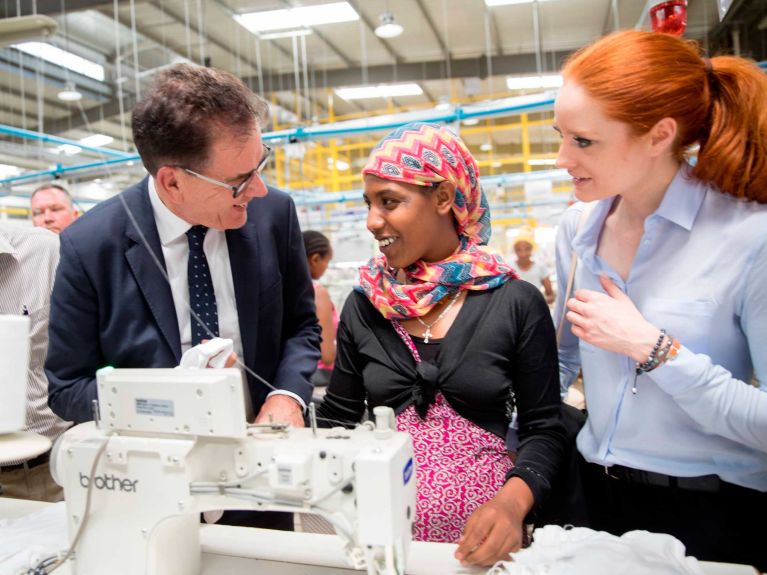“Locking into the global economy strongly”
End of October sees the G20 Investment Summit for Africa hold in Berlin. Stefan Liebing, Chairman of the German-African Business Association, says what Africa now needs – and what Germany must do.

Dr. Liebing, under Germany’s G20 Presidency in 2017 the Compact with Africa (CwA) was launched, with the prime objective being to boost investments and strengthen the continent’s private sector. What has the initiative achieved to date?
With the “Compact with Africa” (CwA) resolved during Germany’s G20 Presidency, the Federal Government has ushered in a new policy on Africa. The focus is now above all on investments in order to advance the continent’s infrastructure and the associated economic development. That is good and is a welcome step. However, we must say that the CwA focuses primarily on reforms on the ground in Africa. That alone will not suffice to incentivise German investments. No German SME will invest in Ruanda or Senegal simply because the structure of the tax system there has been improved. What will therefore be crucial is for us to flesh out the framework of the CwA initiative with bilateral measures, for example to support the German Mittelstand and hedge the risks it faces.

At the end of October the G20 Investment Summit for Africa take place in Berlin. What does Africa need most at the moment?
Our neighbouring continent is young: By 2050 Africa’s population will have doubled, meaning from a good billion today to two billion people – most of whom will be looking for work. In only a few decades a quarter of the world’s working population will be African. Meaning jobs are needed for millions of young people – every year. Which is why the African economies need to lock into the global economy far more strongly – in everyone’s interest. However, that can only function with a self-sustaining economic performance rather than the outdated donor-recipient model. More foreign direct investments are imperative here, alongside the indispensable efforts each African country must itself make to improve framework conditions.
The German economy has for years played a leading role as regards renewable energy – but not yet in Africa.
Minister of Economic Cooperation Gerd Müller calls Africa the “Continent of Opportunities”. What are the greatest ones?
Africa has a middle class of some 360 million people and more mobile phone connections than Europe. New infrastructure projects that are starting to close the shortfall in roads, ports and airports are constantly being launched. We are witnessing the emergence of African entrepreneurship. We are witnessing the will to industrialise Africa – what is more in a way that impacts on the climate as little as possible. In other words, there is a huge need for renewable energy. The German economy has for years played a leading role as regards renewable energy – but not yet in Africa.

To date comparatively few German companies have seized the opportunities Africa offers. Is a change in the pattern now in sight?
Part of German industry is already doing so: Projects worth a total of one billion Euros are ready to be flagged off in 2018, about 1,000 German companies are active as investors in Africa and many thousands of others are doing trade there. However, Germany is definitely not among the main investors, and our commitment is concentrated on a very few countries. So there’s plenty of room for improvement. Because on balance it is the risks that outweigh in how German companies perceive Africa and not the many prospects that the African continent offers. If this is to change, and this is really needed in the field of both development and foreign policy, then the Federal Government needs to more strongly support and promote above all the SMEs in what are perceived to be difficult and highly risky markets.
Germany is a latecomer in Africa. We will not be able to afford to remain that way going forwards.
The German-African Business Association has meanwhile accompanied over 1,000 German corporations en route to Africa. How would you take stock?
With their products and technologies, German companies provide globally sought know-how in meeting the challenges of climate change and industrialisation. As one of the countries that exports most we are also a highly globalised economy in terms of direct investments. Africa really needs modern machines, reliable energy solutions and efficient logistics services be it for processing raw materials, the production of textiles for the world market, or for getting food to its domestic markets. And German companies can participate in the growth and are cherished partners with the technologies they offer; not to mention their special expertise in measures for training staff. German companies today are more successful than ever, but Africa has hitherto not really been on their agenda. In this regard, Germany is a latecomer as regards the opportunities and solving problems. We will not be able to afford to remain that way going forwards.
Interview: Martin Orth
Newsletter #UpdateGermany: You would like to receive regular information about Germany? Subscribe here to:
